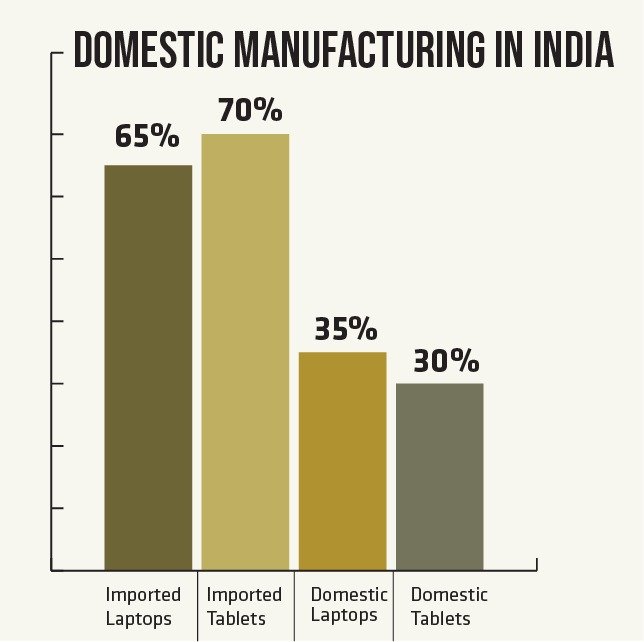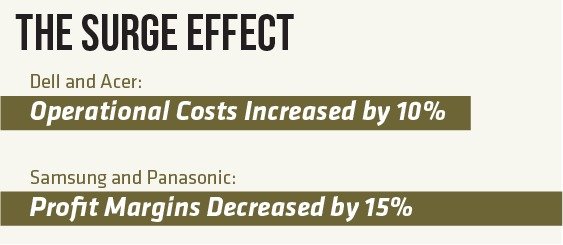Key Highlights:
- India implemented a policy in August 2023 requiring licenses for all imported laptops, tablets, personal computers, and servers.
- The regulation threatened to disrupt the $8 billion Indian market for these companies and posed a substantial obstacle to the $500 million worth of annual exports from the United States to India.
- Shortly after announcing the new policy, the government made a sudden reversal, declaring that it would only oversee imports and postpone any further decisions until a year later.
In a recent development highlighting the intricate dynamics of international trade and diplomacy, the United States has successfully persuaded India to reverse its stringent import regulations on laptops. This significant shift not only highlights the power balance between the two nations but also prompts discussions on the future of digital trade regulations and the role of the World Trade Organization (WTO) in resolving such disputes.
India implemented a policy in August 2023 requiring licenses for all imported laptops, tablets, personal computers, and servers. This policy, sparked concerns throughout the global tech industry, particularly impacting major players like Apple, Dell, and HP. They were required to obtain licenses for shipping imported laptops, PCs, tablets, and servers.
You can also read: What Right Moves for FDI Investment Taken In Bangladesh?
The regulation threatened to disrupt the $8 billion Indian market for these companies and posed a substantial obstacle to the $500 million worth of annual exports from the United States to India. Shortly after announcing the new policy, the government made a sudden reversal, declaring that it would only oversee imports and postpone any further decisions until a year later.
The emails from the US government, acquired through a US open records request, highlight the significant concern the Indian restrictions sparked in Washington and emphasize the rare success of US lobbying efforts in convincing Prime Minister Narendra Modi’s typically steadfast government to backtrack on its policy.
Reacting promptly and strategically to the sudden shift in policy and its potential impact on American enterprises, US officials initiated a string of top-level dialogues with their Indian counterparts. Leading the lobbying charge was US Trade Representative Katherine Tai, who met with Indian Commerce Minister Piyush Goyal on August 26 following the policy announcement.
Beyond-the-Scenes Diplomacy
The private conversations between Tai and Goyal held significant weight. While the public statement from the US Trade Representative (USTR) indicated that Tai had “raised concerns” about the policy and “noted” the necessity for stakeholder consultation, confidential information from a USTR briefing paper revealed that Tai explicitly conveyed to Goyal during their meeting that the US desired India to “rescind the requirement”.
In response, India’s Commerce Ministry, represented by Goyal, acknowledged that Tai had indeed expressed some concerns during their August meeting and that New Delhi had conveyed its security concerns at the time. However, the statement did not provide further details regarding the reversal of India’s decision or the content of the US emails.
Additionally, the US State Department voiced apprehensions regarding the policy. Timothy Wiley, an official from the State Department, highlighted in an email to USTR colleagues, containing “talking points”, that US companies perceived the policy as excessively protectionist and not aligned with the strides India had made in enhancing the investment climate.
The Whys Behind Import Restrictions
The Narendra Modi administration introduced a $2 billion initiative to support local businesses engaged in producing hardware such as laptops, PCs, servers, and associated edge computing kits. This scheme marked an enhancement from the previous program, which allocated $892 million. According to estimates by the Hong Kong-based market research firm Counterpoint, approximately 30% to 35% of laptops and 30% of tablets shipped to India in the first half of 2023 were domestically manufactured.

Of the 7 categories subject to import restrictions by India, a considerable portion of imports originated from China. In April-May 2023, India’s imports from China in these restricted categories totaled US$743.56 million, a 5.6% decline from US$787.84 million in the corresponding period of the previous year. The largest share of imports within these categories was in personal computers, including laptops and palmtops.
The restrictions were aimed at boosting local electronics manufacturing, particularly in laptops and computers, to stimulate growth in the domestic manufacturing sector. India had introduced a Production Linked Incentive (PLI) scheme for IT hardware, offering a 4% incentive on increased production. In May 2023, the scheme underwent a revision. This expansion was primarily intended to decrease reliance on imports.
Furthermore, government officials highlighted the importance of safeguarding Indian citizens, particularly with the growing internet usage nationwide. They expressed concerns about potential security threats posed by certain hardware that could compromise sensitive personal data. Taking these factors into consideration, the government has opted to restrict the importation of these goods.

How the Policy Affected Global Tech Giants?
In recent years, India has experienced a significant increase in the importation of electronic goods. Between April and June 2023, electronic goods imports surged to US$6.96 billion, marking a notable uptick from US$4.73 billion during the same period the previous year. These imports comprise 4 to 7% of the total imports in this timeframe.
The surge had posed challenges for global tech giants such as Dell, Acer, Samsung, Panasonic, Apple, Lenovo, and HP, as they grappled with navigating new import regulations. For instance, Dell and Acer saw a 10% increase in operational costs, while Samsung and Panasonic experienced a 15% reduction in their profit margins.

This entailed adjustments in pricing strategies or reductions in profit margins to sustain competitiveness in the market. Thus, the US lobbied New Delhi to reverse laptop rules, arguing that the new regulations could potentially increase the prices of laptops in India by 20 to 25%.
In conclusion, the US’s lobbying efforts against India’s laptop import rules serve as a case study in the complexities of modern trade diplomacy. It is a reminder that in the globalized economy, national policies can have far-reaching consequences, and international cooperation remains key to resolving trade disputes.


